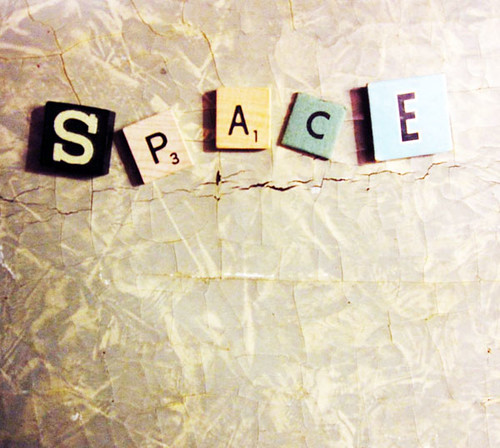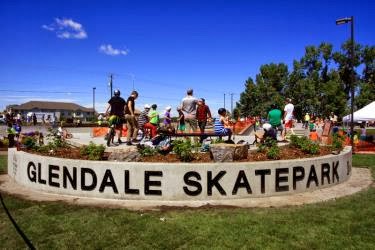Really teachers or facilitators etc. just need to have a space they can hold... and be left alone to do the important work of learning... at whatever speed learning chooses to happen on that given day... less structure, less paperwork... more just being face-to-face and in small groups.I totally agree with Alex on this point, and I tried to emphasize for Keenan that he should be reflecting on the point as well. 'Learning space' can mean many things... physical space, cognitive space, emotional space, experiential space... it's all about perspective. I've been thinking about this idea of 'learning spaces' for a long time. At our school we've set to the task of designing them in multiple contexts to reflect environments of authenticity (to us, purposeful and meaningful learning experiences... those that inspire kids to continue learning, do homework without it being assigned and to conceive their own ideas about how to represent what they've learned,) and effective inquiry based learning. As a result different kinds of collective learning spaces are evolving at our school, and it makes sense for us to reflect on where that is coming from.
It all appears to have started with a particular big question. Kids at our school have a lot of energy for learning. In the spirit of our "Camp Everywhere" perspective, teachers at our school are making the effort to engage this energy in creative and innovative ways. Teachers have been thinking hard about how to connect this energy to process related thinking. T|hey've been encouraging kids to question and challenge them and each other... not to accept the restrictions and challenges that limit possibility. Kids are encouraged to think critically about what, how and why they are learning what they are learning. As a result "what if?" and "do you think we could?" questions started emerging pretty consistently over the course of last year. We ended the year with teachers and students using these big questions strategically to seek direction toward learning activities that are engaging and authentic in every classroom, and when we got it right, self motivated and self directed as well.
Some of these projects are already in the works and rolling along. Last spring the City of Red Deer completed a huge skate park at our school as a centennial celebration legacy project. We were lucky to have our school site as the chosen one.
A group of middle school science students were watching the park get built and began wondering how it would be landscaped. They asked what sort of plants and trees would be planted and commented that sometimes what gets planted in public parks doesn't seem to do so well. They had been learning about public gardening and eventually asked "do you think we could plant edible plants and fruit bearing trees at the site?" Great question... so they were encouraged to write a proposal. They instead filmed a video and presented that to the powers that be. The city officials loved the idea, and a week later the mayor came by to celebrate Arbor Day by donating and planting a Battleford Apple tree, our first edible plant. Winter halted our first raised bed project, but we got back to it and 800 square feet of strawberries, raspberries, blueberries and saskatoon berries were planted this spring. This is awesome stuff that has correlated to innumerable curriculum outcomes across the spectrum of grades at our school. A new learning space has evolved through urban gardening; new connections to the broader community and new ideas are forming as the project moves forward.
A spin off to the outdoor gardening project was born when kids asked "do you think we could plant edible plants inside the school?" With the help of Little Green Thumbs we now have indoor grow equipment installed and powered by solar panels made possible by a grant from BP Canada's A+ for Energy Program.
We have three rooms set up with bright lights, timers, Earthboxes and fans to keep the lights cool. Kids from every grade were excited to see this idea become reality, and learned so much about where food comes from. We've had many people ask us if we're worried that people will eat the fruit and vegetables that will be growing on our school site. We're not... that's why we're doing it! We think a great way to connect our school to the larger community is to feed them, and word about our project is spreading and helping us make connections with other community minded people and agencies wanting to get involved. Kids are thinking about the collective good; sustainable food production and healthy eating... another new learning space has been created. So then we needed a place to meet with them that showcased what we're up to at our school. Enter "Action Cafe."
The Action Cafe idea was hatched by some middle school students. They asked, "do you think we could create a space where we could meet with teachers and community people to talk about our project ideas?" We said yes, and then asked them what they thought that would look, sound and feel like. Some of them had already been involved in the "Starbuck's Classroom" project, so leveraged many of those ideas, added a coffee maker, struck a partnership with a local vendor, and now we have a meeting place to do social collaboration inside our school where people can see and feel what we're doing, instead of meeting at an offsite location to just talk about it. Now we have a new physical learning space where creativity grows and thinking is woven.
There are other examples of learning spaces that work so well for us... I could go on for a long time, but it's important to note that our learning spaces extended outside the school and beyond the school property as well. 'Learning from place' is a concept we take seriously at Glendale. We believe that visceral learning occurs more spontaneously when we can be in the place we're learning about, or that something we're learning about actually happened. So many trips (we call them field studies) took place from as close to inside the forest behind our school to as far as the Rocky Mountains as our grade seven kids explored pre-contact Canadian history through to the fur trade and western expansion by following David Thompson's exploration route and then to Banff, the site of Canada's first national park.
So we need to continue talking about and thinking about 'learning spaces'. What do they look like now within our school as the foundation of learning within our school program? How can they look different so learning is optimized further? What can we do to grow our learning spaces in multiple contexts so kids feel even more connected to school and learning? I'm so please that Keenan is thinking about how to ensure he is able to be a successful teacher in his new position, and I was so glad to have the opportunity to talk with him about learning spaces at Glendale Sciences and Technology School. I'm looking forward to working with him to improve and support them.




.png)
.jpg)
No comments:
Post a Comment